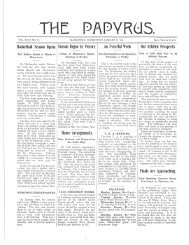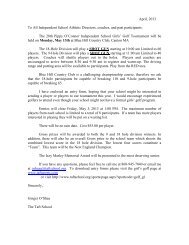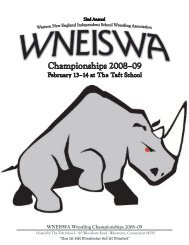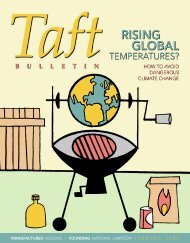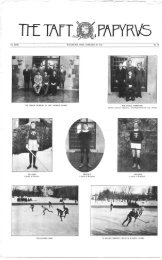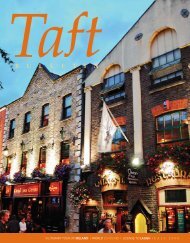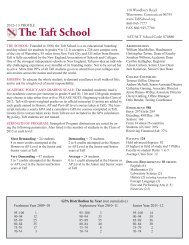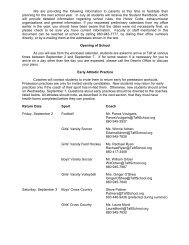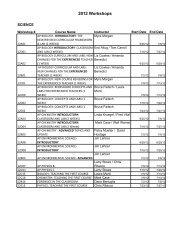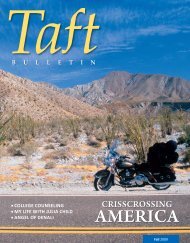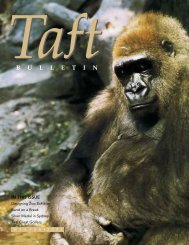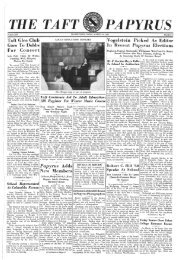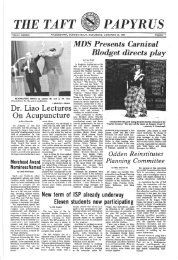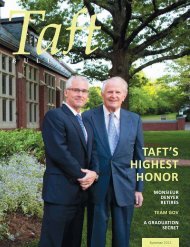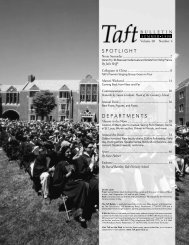B U L L E T I N Taft Portrait of a Graduate - The Taft School
B U L L E T I N Taft Portrait of a Graduate - The Taft School
B U L L E T I N Taft Portrait of a Graduate - The Taft School
- No tags were found...
Create successful ePaper yourself
Turn your PDF publications into a flip-book with our unique Google optimized e-Paper software.
PETER FINGER<br />
ALUMNI SPOTLIGHT<br />
Alumni Citation <strong>of</strong> Merit Awarded to Dr. Alfred G. Gilman ’58<br />
This year’s esteemed Alumni<br />
Citation <strong>of</strong> Merit was awarded<br />
to Nobel Laureate Dr. Alfred<br />
G. Gilman ’58 who serves as<br />
pr<strong>of</strong>essor and chairman <strong>of</strong> pharmacology<br />
at the University <strong>of</strong><br />
Texas Southwestern Medical<br />
Center at Dallas. Dr. Gilman is<br />
their Regental Pr<strong>of</strong>essor and<br />
holds the Raymond and Ellen<br />
Willie Distinguished Chair in<br />
Molecular Neuropharmacology.<br />
In 1994 he was awarded the<br />
Nobel Prize in medicine, along<br />
with co-winner <strong>of</strong> the $930,000<br />
prize Martin Rodbell, for the<br />
discovery <strong>of</strong> G proteins and<br />
their role in signal transduction<br />
in cells. Understanding the<br />
“wiring diagram” <strong>of</strong> a molecule’s<br />
“switchboard” is key in enabling<br />
drugs to work most effectively.<br />
G proteins were discovered in<br />
1980 by Gilman and other<br />
colleagues who have continued to pursue<br />
research on the critical role these<br />
play within cells. Since that time, they<br />
have worked to form an alliance that<br />
will foster sharing <strong>of</strong> research on cell<br />
signaling, creating a database by which<br />
a “virtual cell” might be constructed.<br />
Gilman now serves as director <strong>of</strong> the<br />
Alliance for Cellular Signaling.<br />
In a 2001 issue <strong>of</strong> Molecular Intervention,<br />
Gilman stated <strong>of</strong> the Alliance<br />
and its research, “Our goal<br />
is to generate data—to identify<br />
pieces <strong>of</strong> the signaling ‘puzzle,’<br />
and then see how the pieces fit<br />
together…What we will primarily<br />
<strong>of</strong>fer to the community is free<br />
access to our data and insights<br />
into how signaling systems are<br />
built and organized.” <strong>The</strong>ir findings<br />
will be put in the public<br />
domain through the Internet.<br />
In a 1995 Bulletin interview<br />
Gilman said, “<strong>Taft</strong> taught me<br />
how to study, but more importantly,<br />
<strong>Taft</strong> taught me how to<br />
think, [and] how to go on learning<br />
for the rest <strong>of</strong> my life. <strong>The</strong><br />
foundation I got there has carried<br />
me through until now.”<br />
Gilman has received numerous<br />
pr<strong>of</strong>essional awards<br />
including the Albert Lasker<br />
Award for Basic Medical Research<br />
in 1989, the Richard Lounsbery<br />
Award in 1989, and the John J. Abel<br />
Award in Pharmacology in 1975. In addition,<br />
he has authored over 100<br />
scientific papers for pr<strong>of</strong>essional journals.<br />
<strong>The</strong> 2003 Alumni Citation <strong>of</strong> Merit States:<br />
Alfred Gilman, humanitarian and renowned<br />
leader in the scientific<br />
community, your life’s singular quest<br />
to understand and unravel the secrets<br />
<strong>of</strong> nature for the benefit <strong>of</strong> mankind<br />
was forged at <strong>Taft</strong> where, as a cum<br />
laude society inductee and recipient<br />
<strong>of</strong> the Rensselaer Alumni Medal for<br />
excellence in mathematics and science,<br />
you “learned how to learn.”<br />
Earning your bachelor’s degree in Biochemistry<br />
from Yale University and<br />
doctorates <strong>of</strong> Medicine and Pharmacology<br />
from Case Western Reserve<br />
University, you applied your knowledge<br />
in pursuit <strong>of</strong> unlocking the<br />
mysteries <strong>of</strong> genetics and biochemistry<br />
as Assistant Pr<strong>of</strong>essor <strong>of</strong> Pharmacology<br />
at the University <strong>of</strong> Virginia. But it was<br />
during your tenure as Chair <strong>of</strong> the<br />
Department <strong>of</strong> Pharmacology at the<br />
University <strong>of</strong> Texas Southwestern Medical<br />
Center that the culmination <strong>of</strong> your<br />
prodigious contribution to science was<br />
noted. Hailed for your landmark discovery<br />
<strong>of</strong> the G-Protein component <strong>of</strong> basic<br />
cellular function and communication,<br />
you were recognized as a 1994 Nobel<br />
Laureate in Physiology or Medicine.<br />
Uncompromising and impassioned in<br />
your commitment to excellence, innovative<br />
and principled in your research,<br />
humble and unselfish in your eagerness<br />
to share your success, your<br />
seminal work has been transformational,<br />
engendering hope, inspiration,<br />
and enrichment across the globe.<br />
Alfred Gilman, you have lived a life<br />
<strong>of</strong> purpose and achievement always<br />
dedicated to upholding and preserving<br />
your Alma Mater’s most cherished<br />
ideal: non ut sibi ministretur sed ut<br />
ministret. You have gracefully held<br />
al<strong>of</strong>t the torch lighted by our Founder,<br />
and it is with the greatest pride, respect,<br />
and admiration that we bestow<br />
upon you <strong>Taft</strong>’s highest honor, the<br />
Alumni Citation <strong>of</strong> Merit.<br />
<strong>Taft</strong> Bulletin Summer 2003<br />
7



